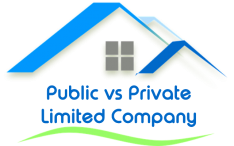In my last post, 9 benefits of a private limited company, I promised I will share with you the differences between a private and public limited liability company. Many entrepreneurs in Cameroon find it difficult to differentiate between a company and a sole proprietorship. I have done my best to make a difference between these two.
I know the confusion comes because, for a sole proprietorship, you can have a name other than the owners name to display as your business name. Many are unaware that this is actually an alias and not the name of the business.
The business license of a sole proprietor business is issued in the name of the owner. This means the owner and the business are inseparable. The owner has unlimited liability to debts – his/her personal assets can be used to settle the debts of the company.
Now let’s see the case of limited company where we have two main types – the private and public limited company. What is actually the difference between a public and private limited company? Let’s see some of the similarities and differences below:
Limited liability
First thing you should note about the two is that they’re both limited liability companies – where the liability of members are limited to the amount of their shares in the business.
Sole member companies
In Cameroon, it is possible for individuals to own all the shares of both a private and public limited liability company. That is, sole member private limited company and a sole member public limited company.
Raising of funds
The shares of private limited company are privately held – this means they cannot be traded in the public or cannot the shares cannot be listed in the stock exchange market.
This is in contrast with public companies that has access to the public markets to raise new funds. This makes it more easier for it to raise more funds with the help of investment banking professionals through an Initial Public Offering (IPO). Investors can easily move in and out of the company when it is listed in the stock exchange by buying and selling shares.
Name designation
Both of them are obliged to be designated by a name during incorporation. However, the difference comes in what precedes or follows – “private limited company” and “public limited company”.
It can also be abbreviated respectively as PLC and P.L.C. Note very well the difference is found in the full-stop signs within the letters. In French, it is SARL for private company and SA for public company.
Minimum authorized capital
There’s a great difference in the minimum authorized capital of the two types of business structures. In Cameroon, the minimum authorized capital of a private limited company is XAF100,000 while that of a public limited company is XAF10,000,000.
Company audit
A public limited company is oblige to appoint an auditor upon it’s creation meanwhile the contrary holds for a private company. However, in the case of a private company, the need for an auditor or audit arises if the articles of association provides for it or the shareholders ask for one.
They will also qualify for an audit if they meet two of the following conditions set forth by the Foundation for a Unified Business Law in Africa (French acronym, OHADA):
- the annual turnover is greater than XAF25,000,000
- the number of staff is more than 50 people
- the total amount of the balance sheet is greater than XAF125,000,000
Reporting requirements
The public disclosure requirement is another great difference between the two types of limited liability companies. There are many disclosure documents that are required to be filed yearly including annual financial reports for public companies.
Management titles
The Foundation for a Unified Business Law in Africa (French acronym, OHADA) has put in place titles and responsibilities that go with the titles. However, misuse of the titles is very common amongst entrepreneurs in Cameroon.
I have seen CEOs, General Managers, Director Generals, Managing Directors, etc. who don’t have registered businesses. The private limited company is headed by a Manager or Gerant in French just like the sole proprietor and partnership businesses.
In the case of a public company, it can be Chief Executive Officer, General Manager, Director General, Managing Director depending on whether it has a board of directors or not.
The private limited liability company has proven to be a successful business structure for small businesses. Shares of the company are privately held and shareholders can manage the business themselves or hire managers to do it on their behalf.
Meanwhile, public limited companies have access to public markets where they can raise new funds. This means they have the benefit of liquidity as they can easily sell shares to the entire public.
Additional resources
- 10 Things to know if you are ready to start a business

- 4 Effective Company Name Change Communication Channels to Consider

- 5 Easy Steps to Form a Limited Liability Company in Cameroon

Was this post helpful? Are you planning to incorporate a limited company in Cameroon? You can drop a comment below or get in touch with us using the contact points below.
Don’t forget to share this with your network.
Sharing is caring.






One thought on “The Difference Between Private and Public Limited Company”